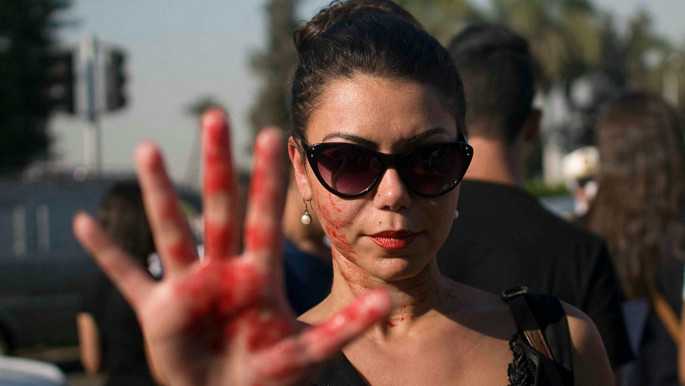Souad: A coming of age story in a virtual world
These are the two central issues tackled by Egyptian filmmaker Ayten Amin in her sophomore feature, Souad.
The film, a 2020 Cannes label selection, was world-premiered in the Panorama section of this year's online edition of the Berlinale, which took place from 1-5 March 2021.
The feature is written by the director herself in collaboration with Mahmoud Ezzat (also from Amin's debut feature-film Villa 69), and produced by Sameh Awad for Vivid Reels (Ahmed Rashwan's Fragile).
The film follows the titular 19-year-old girl Souad (played by talented newcomer Bassant Ahmed), who lives in Zagaziz – a small city on the Nile Delta. Yet, as we soon find out, our quaint, if excitable, protagonist leads a double life.
 |
For Souad, fantasising and telling others (and herself) untrue stories becomes a much-needed coping mechanism |  |
On the one hand, she is a responsible student who shows deep respect and devotion towards her family and society; on the other, the girl builds up a digital alter-ego, re-imagining herself as a desirable, cosmopolitan young woman and engaging in several secret relationships.
Later, a series of small incidents lead to a tragic event, which push Rabab (Basmala Elghaiesh), her 13-year-old sister, to embark on a real-life journey looking for answers.
From its very beginning, Souad presents a naturalistic visual look, bolstered by a documentary-like camera work vaguely echoing social realist cinema and often depicting characters from a very close distance (courtesy of DoP Maged Nader).
The film's opening is spot on and effectively introduces the story's main conflict.
We see Souad wearing her hijab and sitting on a bus. She is chatting with an older passenger, introducing herself as an obedient young woman in love with her fiancé Ahmed and eager to enrol in a school of medicine.
This brief scene is followed by another shot depicting her chewing gum, talking to another stranger and making up a totally different story.
For Souad, fantasising and telling others (and herself) untrue stories becomes a much-needed coping mechanism, helping her to bear the numerous pressures imposed by her family and her Muslim faith
 |
| Read also: Ending sexual harassment in Egypt |
Her desire to escape, however, must face a harsh reality.
In a subsequent scene, in fact, we see her wearing her veil, silently cleaning up the living room and ready to obey her father's (Islam Shalaby) orders to move the TV cabinet in the right position, make tea and bring cookies.
Meanwhile, the mother's presence (Mona Elnamoury), relegated to the role of obedient housewife is barely perceivable, and the relationship with Rabab seems rather estranged.
In other words, Souad is part of a family façade wherein things may look alright on the surface, while in truth inner demons are slowly devouring its members.
This is the second theme of the film that speaks universally, alongside the every present conflict between the real and the digital.
|
|
Even though Souad may appear as a rather verbose movie – and in fairness it is, at least for the most part – its wordy dialogues serve to exploit chatter as a distraction tool from dealing with uncomfortable inner pulsions.
To control them, the girl's smartphone comes to the rescue and becomes a sort of secret casket, a reliable friend and a mirror that reflects her own desired image; a place where comfort can be relatively easy to find, at any time.
In this context, even real-life friendships suffer. Her friendship with open-minded Wessam (Hager Mahmoud) and a more conservative Amira (Sarah Shedid) play second fiddle to Souad's obsession with the digital world.
Within the narrative focus, Soaud's confused path to adulthood, is dominated by her unhealthy fascination with the digital world, further blurred by her new romantic connections.
While exploring her own "digital comfort zone," Souad gets to know Ahmed (Hussein Ghanem), an older boy from the city Alexandria.
Unsurprisingly, the man works as a content creator for social media platforms such as Facebook and TikTok and does not seem to be particularly invested in his relationship with Souad.
The story's main turning point – no spoilers for the sake of your viewing experience – allows Rabab to take centre stage throughout the second part of the film.
Entirely shot on location and staged by a good cast of non-professional actors, this Egyptian-Tunisian-German co-production is a timely drama that speaks about the overwhelming conflict between the real and the digital through the eyes of a Middle Eastern Gen Z girl, and does it in an admirably unpretentious fashion.
The film's structure and pacing, at times uneven, are widely compensated by the cast’s credible performances and a rare non judgemental storytelling.
Davide Abbatescianni is an Italian Film Critic and Journalist based in Cork, Ireland.
Follow him on Twitter: @dabbatescianni
![Souad [Ayten Amin] Souad [Ayten Amin]](/sites/default/files/styles/image_345x195/public/media/images/88244078-C563-4A46-A481-A252E0FCD972.jpg?h=d1cb525d&itok=WW1Pb3CA)



 Follow the Middle East's top stories in English at The New Arab on Google News
Follow the Middle East's top stories in English at The New Arab on Google News


